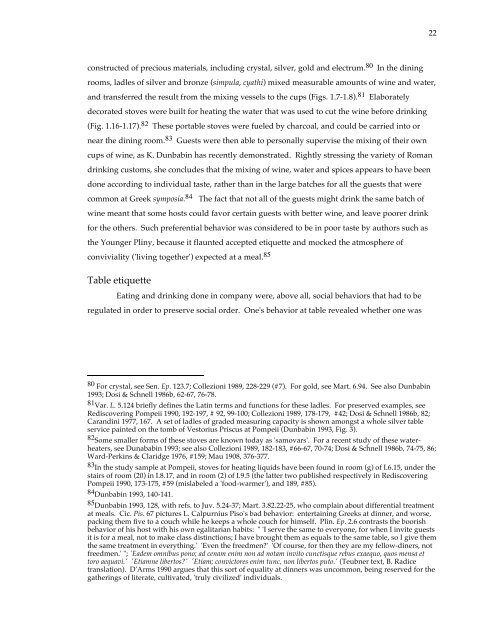KITCHENS AND DINING ROOMS AT POMPEII ... - Get a Free Blog
KITCHENS AND DINING ROOMS AT POMPEII ... - Get a Free Blog
KITCHENS AND DINING ROOMS AT POMPEII ... - Get a Free Blog
Create successful ePaper yourself
Turn your PDF publications into a flip-book with our unique Google optimized e-Paper software.
constructed of precious materials, including crystal, silver, gold and electrum. 80 In the dining<br />
rooms, ladles of silver and bronze (simpula, cyathi) mixed measurable amounts of wine and water,<br />
and transferred the result from the mixing vessels to the cups (Figs. 1.7-1.8). 81 Elaborately<br />
decorated stoves were built for heating the water that was used to cut the wine before drinking<br />
(Fig. 1.16-1.17). 82 These portable stoves were fueled by charcoal, and could be carried into or<br />
near the dining room. 83 Guests were then able to personally supervise the mixing of their own<br />
cups of wine, as K. Dunbabin has recently demonstrated. Rightly stressing the variety of Roman<br />
drinking customs, she concludes that the mixing of wine, water and spices appears to have been<br />
done according to individual taste, rather than in the large batches for all the guests that were<br />
common at Greek symposia. 84 The fact that not all of the guests might drink the same batch of<br />
wine meant that some hosts could favor certain guests with better wine, and leave poorer drink<br />
for the others. Such preferential behavior was considered to be in poor taste by authors such as<br />
the Younger Pliny, because it flaunted accepted etiquette and mocked the atmosphere of<br />
conviviality ('living together') expected at a meal. 85<br />
Table etiquette<br />
Eating and drinking done in company were, above all, social behaviors that had to be<br />
regulated in order to preserve social order. One's behavior at table revealed whether one was<br />
80 For crystal, see Sen. Ep. 123.7; Collezioni 1989, 228-229 (#7). For gold, see Mart. 6.94. See also Dunbabin<br />
1993; Dosi & Schnell 1986b, 62-67, 76-78.<br />
81 Var. L. 5.124 briefly defines the Latin terms and functions for these ladles. For preserved examples, see<br />
Rediscovering Pompeii 1990, 192-197, # 92, 99-100; Collezioni 1989, 178-179, #42; Dosi & Schnell 1986b, 82;<br />
Carandini 1977, 167. A set of ladles of graded measuring capacity is shown amongst a whole silver table<br />
service painted on the tomb of Vestorius Priscus at Pompeii (Dunbabin 1993, Fig. 3).<br />
82 Some smaller forms of these stoves are known today as 'samovars'. For a recent study of these waterheaters,<br />
see Dunababin 1993; see also Collezioni 1989, 182-183, #66-67, 70-74; Dosi & Schnell 1986b, 74-75, 86;<br />
Ward-Perkins & Claridge 1976, #159; Mau 1908, 376-377.<br />
83 In the study sample at Pompeii, stoves for heating liquids have been found in room (g) of I.6.15, under the<br />
stairs of room (20) in I.8.17, and in room (2) of I.9.5 (the latter two published respectively in Rediscovering<br />
Pompeii 1990, 173-175, #59 (mislabeled a 'food-warmer'), and 189, #85).<br />
84 Dunbabin 1993, 140-141.<br />
85 Dunbabin 1993, 128, with refs. to Juv. 5.24-37; Mart. 3.82.22-25, who complain about differential treatment<br />
at meals. Cic. Pis. 67 pictures L. Calpurnius Piso's bad behavior: entertaining Greeks at dinner, and worse,<br />
packing them five to a couch while he keeps a whole couch for himself. Plin. Ep. 2.6 contrasts the boorish<br />
behavior of his host with his own egalitarian habits: " 'I serve the same to everyone, for when I invite guests<br />
it is for a meal, not to make class distinctions; I have brought them as equals to the same table, so I give them<br />
the same treatment in everything.' 'Even the freedmen?' 'Of course, for then they are my fellow-diners, not<br />
freedmen.' "; 'Eadem omnibus pono; ad cenam enim non ad notam invito cunctisque rebus exaequo, quos mensa et<br />
toro aequavi.' 'Etiamne libertos?' 'Etiam; convictores enim tunc, non libertos puto.' (Teubner text, B. Radice<br />
translation). D'Arms 1990 argues that this sort of equality at dinners was uncommon, being reserved for the<br />
gatherings of literate, cultivated, 'truly civilized' individuals.<br />
22


